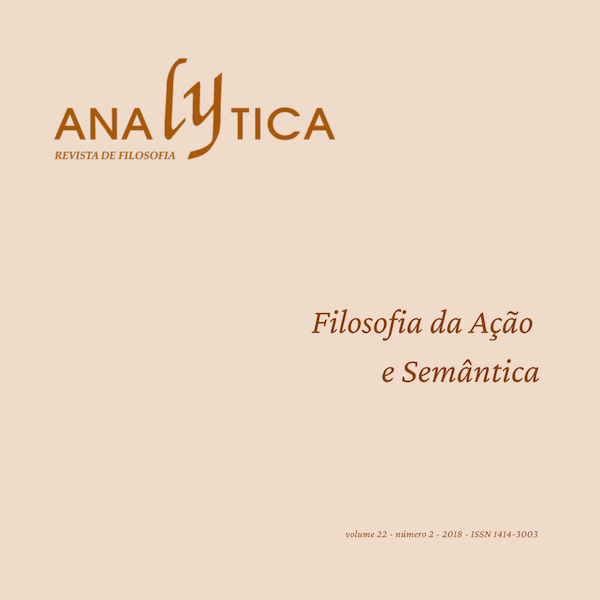Los acuerdos de Kierkegaard y Hegel sobre la demostración de la Existencia de Dios
DOI:
https://doi.org/10.35920/arf.v23i1.43436Palavras-chave:
Kierkegaard, Hegel, prova ontológica, existência de DeusResumo
Resumo
O objetivo da reflexão é conseguir um contato assertivo entre Hegel e Kierkegaard, quando ambos analisam a tarefa demonstrativa com a prova ontológica da existência de Deus. Trata-se de aproveitar que Kierkegaard reflete um pouco sobre a lógica do pensamento nas Migalhas filosóficas, para buscar um acordo com Hegel nessas áreas, além dos confrontos habituais entre o “existencialismo” de um e o “logicismo” do outro. Ao longo de quatro séries ou eixos argumentativos, ambos os autores, em seus respectivos modos, analisarão detalhes da prova ontológica da existência de Deus e, na minha opinião, se familiarizarão com a mesma ideia, segundo a qual: a demonstração da existência de Deus começa demonstrada. Basicamente, eles chegarão ao dilema socrático-platônico da reminiscência ou de "saber que você sabe".
Abstract
The objective of the reflection is to achieve an assertive contact between Hegel and Kierkegaard, when both analyze the demonstrative task with the ontological proof of the existence of God. It is about taking advantage that Kierkegaard reflects a little on the logic of thought in Philosophical fragments, to seek an agreement with Hegel in these areas, beyond the usual confrontations between the “existentialism” of one and the “logicism” of the other. Throughout four series or argumentative axes, both authors, in their respective modes, will analyze details of the ontological proof of the existence of God and, in my opinion, will become familiar under the same idea, according to which: the demonstration of the existence of God begins demonstrated. Basically, they will arrive at the Socratic-Platonic dilemma of reminiscence or of "knowing that you know".
Downloads
Referências
BIENENSTOCK M. 1995. Hegel's Conception of Teleology. In: GAVROGLU K., STACHEL. J., WARTOFSKY. MW (eds) Ciencia, Mente y Arte. Boston Studies in the Philosophy of Science, vol 165. Dordrecht: Springer.
BRINKMANN K. 2011. Idealism Without Limits. Philosophical Studies in Contemporary Culture vol. 18, Springer Science+Business Media B.V.
FINDLAY J.N. 1974. Reflexive Asymmetry: Hegel’s Most Fundamental Methodological Ruse. In: WEISS, F.G. (ed). Beyond Epistemology. Dordrecht: Springer.
HARRIS, E.E. 1974. Hegel and the Natural Sciences. In: WEISS, F.G. (ed). Beyond Epistemology. Dordrecht: Springer.
HEGEL. 2015. Ciencia de la lógica. Trad. Félix Duque. Madrid: Abada Editores.
HEGEL. 2010. Fenomenología del espíritu. Trad. Antonio Gómez Ramos. Madrid: Abada Editores.
KIERKEGAARD, S. 2004. Migajas filosóficas. Trad. Rafael Larrañeta. Madrid, España: Editorial Trotta.
WHITTAKER, J. 1979. Kierkegaard on Names, Concepts, and Proofs for God's Existence. International Journal for Philosophy of Religion vol. 10, no 2, pp. 117-129. DOI: https://doi.org/10.1007/bf00143160
Downloads
Publicado
Como Citar
Edição
Seção
Licença
Os autores que publicam nesta revista concordam com os seguintes termos:
- Os autores mantêm os direitos autorais e concedem à revista o direito de primeira publicação, com o trabalho simultaneamente licenciado sob a Licença Creative Commons Atribuição-SemDerivações 4.0 Internacional (CC BY-ND 4.0), que permite a redistribuição, comercial ou não comercial, desde que a obra original não seja modificada e que seja atribuído o crédito ao autor.
- Os autores têm autorização para assumir contratos adicionais separadamente para distribuição não-exclusiva da versão do trabalho publicada nesta revista (ex.: publicar em repositório institucional ou como capítulo de livro), com reconhecimento de autoria e publicação inicial nesta revista.
- Os autores têm permissão e são estimulados a publicar e distribuir seu trabalho online (ex.: em repositórios institucionais ou na sua página pessoal) a qualquer ponto antes ou durante o processo editorial, já que isso pode gerar alterações produtivas, bem como aumentar o impacto e a citação do trabalho publicado (Veja O Efeito do Acesso Livre).






